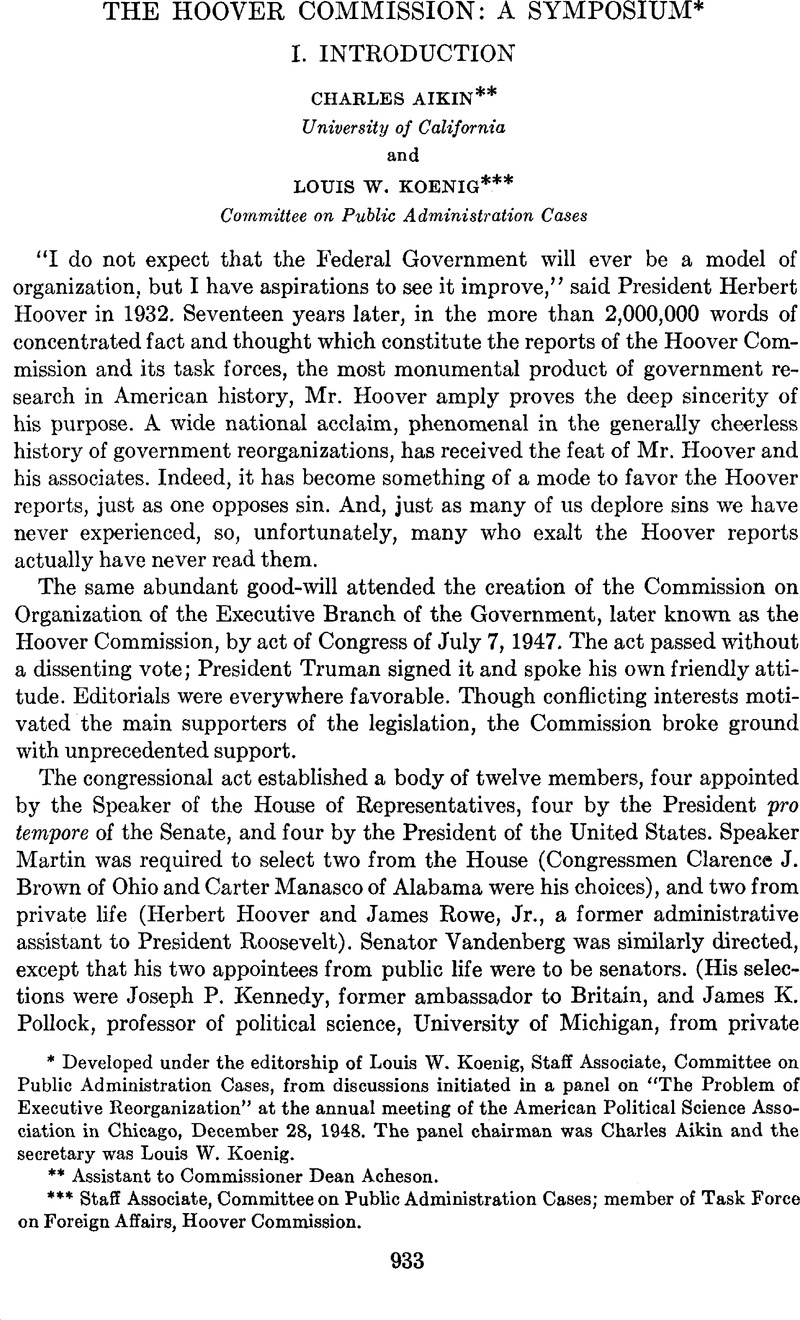No CrossRef data available.
Article contents
VII. Improving Federal Management Services
Published online by Cambridge University Press: 02 September 2013
Abstract

- Type
- The Hoover Commission: A Symposium
- Information
- Copyright
- Copyright © American Political Science Association 1949
References
1 The Commission could have done a better job of titling some of its reports. The report called Budgeting and Accounting, for example, actually has appended to it a separate report entitled Statistical Activities.
2 Public Law 109, 81st Cong., approved June 20, 1949.
3 American Legion, Veterans of Foreign Wars, and Disabled American Veterans. There are many organizations of veterans, but these three are the ones always listened to by members of Congress.
4 “Disabled” veterans would be defined as those with a compensable disability, and hence would exclude veterans with non-impairing disabilities, as, for example, a scar resulting from a wound to the lobe of the ear or from an appendectomy. To allow disability preference to a veteran with this kind of “disability” is unfair both to the ordinary veteran and to the veteran who is really disabled. The task force clearly showed that the present system is hurting the cause of all veterans, not helping it.
5 Commissioner James K. Pollock dissented from this recommendation and offered a well-expressed “case for a single personnel administrator.” Professor Pollock comes close to being convincing.
6 Actions on appeals involving reductions in force furnish an example. During the five fiscal years ending June 30, 1949, the number of appeals to the Civil Service Commission's headquarters office totaled 4,404, with these results:
A. Sustained (employees won), 306, or 7 per cent.
B. Closed without action because management kept the employees (employees won), 1,885, or 43 per cent.
C. Withdrawn by employee (management won), 699, or 16 per cent.
D. Denied (management won), 1,514, or 34 per cent.
About half of the 1,885 cases that were closed without Commission action were closed after the Commission had negotiated with the agencies. Thus it can be said that roughly three out of every ten “R.I.F.” appeals to the Commission resulted in defeats for management. This undesirable situation will be somewhat bettered by virtue of the Commission's new regulations on reductions in force (effective September 1, 1949).
7 Cong. Record, Aug. 2, 1949, p. 10813Google Scholar.
8 Occasionally Congress does not get around to appropriating money for a given department until well into the fiscal year. This happened only this past summer, when the appropriation bills for most of the federal departments were not enacted until September. In this case, the appropriation for one year is not yet determined when the estimates are being prepared for the succeeding year!
9 S. 2054 and H.R. 5178, introduced June 13 and 15, 1949, would allow the President to transmit his budget sometime “during the first three months of each regular session of Congress”; this would give the President until the first week in April.
10 Professor Pollock agreed with Rowe's views.
11 This provision is incorporated in S. 2054 and H.R. 5178 (Sec. 21).
12 The task force on supply listed six obstacles to an effective supply system. The first obstacle: “Stagnating influence of General Accounting Office.”
13 “The Study of Administration” appeared in the Political Science Quarterly in 1887, was reprinted in that journal in 1941, and has recently been included in the book of essays entitled Processes of Organization and Management edited by Catheryn Seckler-Hudson.





Comments
No Comments have been published for this article.